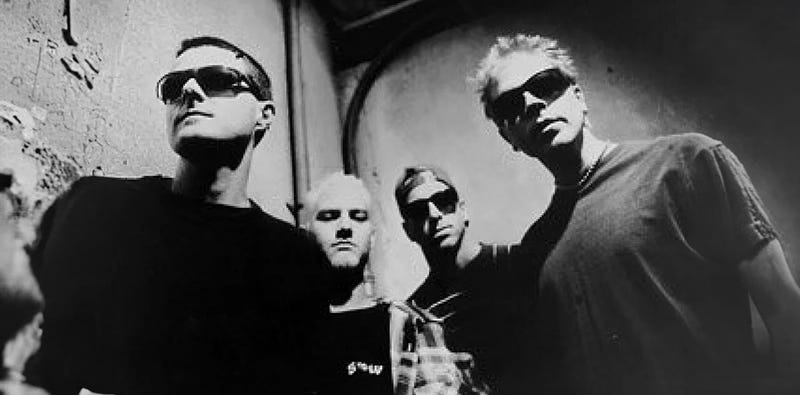The Offspring | History of the Band
From SoCal Punk Roots to 90s Icons, Blending Raw Energy, Catchy Hooks, and a Sense of Humor
The Offspring, hailing from Garden Grove, California, emerged in 1984 as a pivotal force in the punk rock scene. Founded by vocalist and guitarist Bryan “Dexter” Holland and bassist Greg Kriesel, the band initially performed under the name Manic Subsidal. By 1986, they rebranded as The Offspring, solidifying their lineup with the addition of guitarist Kevin “Noodles” Wasserman and drummer Ron Welty. Their early sound was heavily influenced by Southern California punk rock, drawing inspiration from bands like Bad Religion and T.S.O.L.
Throughout the 1990s, The Offspring’s music evolved from raw punk roots to a more polished blend of punk rock and alternative elements. Their early work showcased fast tempos, aggressive guitar riffs, and socially conscious lyrics. As the decade progressed, they incorporated melodic hooks and experimented with diverse musical styles, including ska and pop-punk, broadening their appeal without sacrificing their core punk ethos.
Darren 🇦🇺 suggested this artist for a future Dig Me Out podcast episode. Each month, our Patrons are presented with a selection of albums suggested by listeners and asked to vote for their favorite.
Discography and Notable 90s Albums
“Ignition” (1992): Released under Epitaph Records, this album was recorded at Westbeach Recorders in Hollywood, California, with Thom Wilson as producer. “Ignition” features tracks like “Kick Him When He’s Down” and “Dirty Magic,” highlighting the band’s developing songwriting skills and energetic performances.
“Smash” (1994): Also released by Epitaph Records, “Smash” was recorded at Track Record in North Hollywood, California, with Thom Wilson returning as producer. This album catapulted The Offspring to international fame, featuring hits like “Come Out and Play” and “Self Esteem.” “Smash” became the best-selling album released on an independent label, with over 11 million copies sold worldwide.
“Ixnay on the Hombre” (1997): Marking their transition to Columbia Records, this album was recorded at Eldorado Recording Studios in Burbank, California, with Dave Jerden as producer. “Ixnay on the Hombre” includes tracks like “All I Want” and “Gone Away,” showcasing a more experimental approach while retaining their punk roots.
“Americana” (1998): Also under Columbia Records, “Americana” was recorded at Eldorado Recording Studios and Sparky Dark Studio in Calabasas, California, with Dave Jerden and Jack Joseph Puig as producers. This album features the hit singles “Pretty Fly (for a White Guy)” and “The Kids Aren’t Alright,” blending punk rock with pop sensibilities. “Americana” achieved multi-platinum status, solidifying the band’s mainstream success.
The Offspring’s 1990s releases received a mix of critical responses. “Ignition” was praised for its raw energy and solidified their presence in the punk scene. “Smash” garnered widespread acclaim, with critics lauding its catchy hooks and relatable lyrics; Rolling Stone noted its “unrelenting energy and infectious melodies.” “Ixnay on the Hombre” received mixed reviews, with some critics appreciating the band’s experimentation, while others felt it lacked the impact of its predecessor. “Americana” was well-received, with AllMusic highlighting its “clever songwriting and polished production.”
Influence and Legacy
The Offspring’s influence on punk rock and alternative music extended far beyond their massive success in the 1990s. They inspired a generation of punk and pop-punk bands, including Blink-182, Sum 41, and Good Charlotte, with their ability to craft songs that combined punk energy, catchy hooks, and sharp social commentary. Their contributions helped bridge the gap between the underground punk scene and mainstream radio, opening doors for punk rock’s rise in the late 90s and early 2000s.
After the 1990s, The Offspring continued to evolve while maintaining their place as one of the most successful punk rock bands. They released several albums in the 2000s and 2010s, such as Conspiracy of One (2000), which featured the hit single “Original Prankster,” and Splinter (2003), known for the track “Hit That.” They followed these with Rise and Fall, Rage and Grace (2008), which included the single “You’re Gonna Go Far, Kid,” a song that became a significant success on modern rock charts.
In 2012, the band released Days Go By, showcasing their continued experimentation with sound while staying true to their punk roots. While maintaining their presence in the studio, The Offspring also became known for their relentless touring schedule, frequently headlining major festivals and embarking on global tours.
Outside of their music, The Offspring’s members have pursued diverse projects and personal achievements. Frontman Dexter Holland has balanced his role in the band with notable accomplishments, including earning a Ph.D. in molecular biology and launching the popular hot sauce brand Gringo Bandito, which has gained a dedicated following. Guitarist Noodles (Kevin Wasserman) has remained active in the punk scene and committed to The Offspring. Bassist Greg Kriesel, a founding member who played with the band until 2018, stepped away after a legal dispute but remained an integral part of their early history. Meanwhile, drummer Ron Welty, who left the band in 2003, formed Steady Ground, where he continued to explore new musical ventures and showcase his talents outside of The Offspring.
Despite lineup changes and shifts in the music industry, The Offspring has remained a cornerstone of the punk rock world. Their legacy lies in their ability to evolve musically while staying true to their roots, crafting albums and singles that resonate with new generations of fans. In the 1990s, they played a pivotal role in bringing punk rock to mainstream audiences, blending humor, insight, and sharp songwriting. Their rise from the underground scene to international stardom reflects the transformative spirit of 90s music, an era defined by its openness to innovation and diverse sounds.



